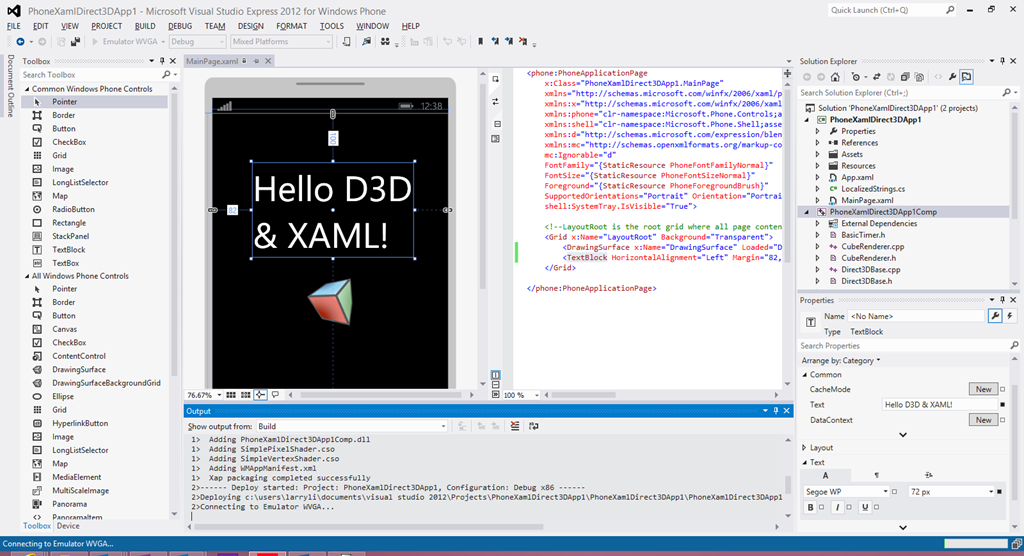The advent of Windows Phone 8 sees the platform moving to a common Windows core and closer alignment with Windows 8. As Microsoft explain, the result of this is that almost every major subsystem in the platform had to change.
For the .NET Framework, we moved from using .NET CF to Core CLR, two different versions of the Framework that forked from each other over five years ago. This gives developers far more capability...
This investment, in turn, allows developers to take advantage of support for native C++ programming, familiar tools, and common APIs to target phones, PCs, and tablets for an estimated combined opportunity of roughly 500 million units next year.

Windows Phone 8 SDK description:
The Windows Phone SDK 8.0 is a full-featured development environment to use for building apps and games for Windows Phone 8.0 and Windows Phone 7.5. The Windows Phone SDK provides a stand-alone Visual Studio Express 2012 edition for Windows Phone or works as an add-in to Visual Studio 2012 Professional, Premium or Ultimate editions. With the SDK, you can use your existing programming skills and code to build managed or native code apps. In addition, the SDK includes multiple emulators and additional tools for profiling and testing your Windows Phone app under real-world conditions.
The SDK contains the following components:
- Microsoft Visual Studio Express 2012 for Windows Phone – Easily design, develop, build, debug and validate your Windows Phone 8 and Windows Phone 7.1 apps, taking advantage of the familiar Visual Studio environment. If you are already using a non Express Edition of Visual Studio 2012, the Windows Phone 8 Add-in for Visual Studio lets you develop apps alongside your Windows 8 store, web, cloud, Xbox and other apps.
- Windows Phone Emulators – The SDK includes new Windows Phone 8 Emulators in 3 screen sizes (WVGA, WXGA and 720p) with 1GB RAM and an additional 512MB RAM version of WVGA for validating your Windows Phone 8 apps on different targets. A machine running Windows 8 with SLAT enabled is required to be able to run these emulators. The SDK also includes the older Windows Phone 7.1 Emulators (512MB RAM and 256MB RAM) to support development and testing of Windows Phone 7.1 apps and these will also work on non-SLAT machines.
- Microsoft Expression Blend for Windows Phone – Blend is a professional designer tool for building immersive UI experiences for Windows Phone apps and is included as part of the SDK. Both 7.1 and 8.0 apps can be targeted using this designer.
- Microsoft Team Explorer – Microsoft Team Foundation Server (TFS) Client allows you to take advantage of the powerful ALM and Source Control capabilities of TFS for advanced application development.
- XNA Game Studio – Enables you to continue developing games for existing Windows Phone 7.1 devices, along with desktop and Xbox 360.
The Windows Phone SDK 8.0 can be downloaded from the Windows Phone Dev Center. The download clocks in at up to 1.6GB and requires Windows 8 (64-bit), 4GB of free hard disk space, 4GB RAM, and a 64-bit (x64) CPU.
On the registration discount Microsoft note that this is a limited time offer, and the saving comes in the form or a rebate:
Windows Phone 8 is out, the tools are available, and devices are about to be released—it’s time to get coding. As an added incentive, for the next 8 days individual developers can register for a Dev Center account for just $8 (a 92 percent savings). Please note because this is a very limited time offer. You’ll be charged $99 USD or equivalent in your local currency, and we’ll refund the difference in the next 30 to 45 days. Watch for more details on Dev Center soon.
Writing on the Windows Phone Developer Blog Kevin Gallo, lead for the developer experience, notes that, with the arrival of Windows Phone 8, there is a significance increase in the opportunity available to developers.
The phone market alone represents a tremendous opportunity.Windows Phone will be available through 50 of the top mobile operators worldwide starting next month. The expansion of phone hardware options and Windows Phone Store to 191 markets equates to a 90 percent increase in addressable market for your apps in 2012.
More information
Overview post on Windows Phone Developer Blog
Introducing Windows Phone SDK 8.0 on The Visual Studio Blog
Announcing the release of the .NET Framework for Windows Phone 8 on the .NET Framework Blog
